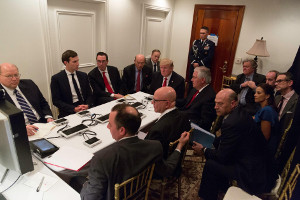Iran is complying with the P5+1 nuclear deal. Of all the debates surrounding the issue, that’s the one constant, with the IAEA repeatedly reaffirming full compliance. To the extent there is still a battle surrounding the issue, rather, it’s wholly going on within the Trump Administration.
 Monday night was the deadline for the US to recertify Iran’s compliance to Congress, something they have to do every 90 days. While this should just be a rubber stamp of the IAEA, who is actually responsible for monitoring compliance, reports out of the administration suggest President Trump came very close to refusing to do so.
Monday night was the deadline for the US to recertify Iran’s compliance to Congress, something they have to do every 90 days. While this should just be a rubber stamp of the IAEA, who is actually responsible for monitoring compliance, reports out of the administration suggest President Trump came very close to refusing to do so.
In a growing battle between Trump and his cabinet, Trump was planning to tell Congress he wouldn’t recertify compliance, while conceding that there was no example of Iran not complying with the deal. This would’ve given Congress a legal pretext to vow to withdraw the US from the deal entirely.
Most of the cabinet, however, recognizes what a bad idea this is, and how big of an international backlash the US would face in withdrawing from the hard-negotiated nuclear deal. Scrambling to convince Trump to recertify was a protracted effort, underscored by the final certification coming very late Monday night, at the deadline.
Trump argued that the US needed to put pressure on Iran even if they weren’t doing anything wrong, and reportedly imposed “certain conditions” on his cabinet before finally allowing the recertification to go out.
It’s still not clear what those conditions were, but we can take a guess from US actions surrounding the recertification. The recertification itself came with a side-statement insisting that Trump is very unhappy with the deal, and believes Iran is violating “the spirit” of the deal he doesn’t like in the first place in non-specific ways.
On top of that, the US imposed a whole new round of sanctions on Iran Tuesday morning, nominally because Iran still has a conventional ballistic missile program. Such sanctions have been widely seen as the US violating the P5+1 deal.
This is likely the US policy going forward, at least for now, efforts to sabotage the deal with violations while grudgingly conceding that Iran isn’t actually violating the deal.


